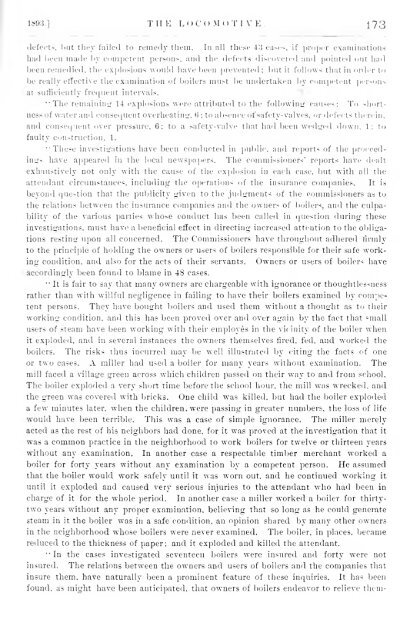The Locomotive - Lighthouse Survival Blog
The Locomotive - Lighthouse Survival Blog
The Locomotive - Lighthouse Survival Blog
You also want an ePaper? Increase the reach of your titles
YUMPU automatically turns print PDFs into web optimized ePapers that Google loves.
1893.] THE LOCOMOTIVE. 173<br />
defects, l)iit they failed to remedy tliein. In all these 43 cases, if proper examiiiatious<br />
had been made by competent persons, and the defects discovered and pointed out had<br />
been remedied, the explosions would have been prevented; but it follows that in order to<br />
be really effective the examination of boilers must be undertaken by competent persons<br />
at sutticieutly frequent intervals.<br />
*»<br />
"<strong>The</strong> remaining 14 explosions were attributed to the following causes: To short-<br />
ness of water and consequent overheating, 6 ; to absence of safety-valves, or defects therein,<br />
and consequent over pressure, 6; to a safety-valve that had been wedged down. 1; to<br />
faulty construction, 1.<br />
"<strong>The</strong>se investigations have been conducted in public, and reports of the proceed-<br />
ings have appeared in the local newspapers. <strong>The</strong> commissioners' reports have dealt<br />
exhaustively not only with the cause of the explosion in each case, but with all the<br />
attendant circumstances, including the operations of the insurance companies. It is<br />
beyond question that the publicity given to the judgments of the commissioners as to<br />
the relations between the insurance companies and the owners of boilers, and the culpa-<br />
bility of the various parties whose conduct has been called in question during these<br />
investigations, must have a beneficial effect in directing increased attention to the obliga-<br />
tions resting upon all concerned. <strong>The</strong> Commissioners have throughout adhered firmly<br />
to the principle of holding the owners or users of boilers responsible for their safe work-<br />
ing condition, and also for the acts of their servants. Owners or users of boilers have<br />
accordingly been found to blame in 48 cases.<br />
"It is fair to say that many owners are chargeable with ignorance or thoughtlessness<br />
rather than with willful negligence in failing to have their boilers examined by compe-<br />
tent persons. <strong>The</strong>y have bought boilers and used them without a thought as to their<br />
working condition, and this has been proved over and over again by the fact that small<br />
users of steam have been working with their employes in the vicinity of the boiler when<br />
it exploded, and in several instances the owners themselves fired, fed, and worked the<br />
boilers. <strong>The</strong> risks thus incurred may be well illustrated by citing the facts of one<br />
or two cases. A miller had used a boiler for many years without examination. <strong>The</strong><br />
mill faced a village green across which children passed on their way to and from school.<br />
<strong>The</strong> boiler exploded a very short time before the school hour, the mill was wrecked, and<br />
the green was covered with bricks. One child was killed, but had the boiler exploded<br />
a few minutes later, when the children, were passing in greater numbers, the loss of life<br />
would have been terrible. This was a case of simple ignorance. <strong>The</strong> miller merely<br />
acted as the rest of his neighbors had done, for it was proved at the investigation that it<br />
was a common practice in the neighborhood to work boilers for twelve or thirteen years<br />
without any examination. In another case a respectable timber merchant worked a<br />
boiler for forty years without any examination by a competent person. He assumed<br />
that the boiler would work safely until it was worn out, and he continued working it<br />
until it exploded and caused very serious injuries to the attendant Tvho had been in<br />
charge of it for the whole period. In another case a miller worked a boiler for thirtytwo<br />
years w^ithout any proper examination, believing that so long as he could generate<br />
steam in it the boiler was in a safe condition, an opinion shared by many other owners<br />
in the neighborhood whose boilers were never examined. <strong>The</strong> boiler, in places, became<br />
reduced to the thickness of paper; and it exploded and killed the attendant.<br />
"In the cases investigated seventeen boilers were insured and forty were not<br />
insured. <strong>The</strong> relations between the owners and users of boilers and the companies that<br />
insure them, have naturally been a prominent feature of these inquiries. It has been<br />
found, as might have been anticipated, that owners of boilers endeavor to relieve them-
















